
You may not know their names, but you know their work.
Jamal Sims has a long and prestigious career as a choreographer and dancer, having choreographed for Madonna, Toni Braxton, Jennifer Lopez, *NSYNC and the Spice Girls, among many other musical acts, and staged the dances for the Step Up film series. He also designed the dance for that notorious, viral Virgin America flight safety video with Todrick Hall.
Randy Barbato & Fenton Bailey enjoy an acclaimed career as documentary filmmakers, having directed the popular films including Inside Deep Throat, Being Chaz, Wishful Drinking and They Eyes of Tammy Faye. They also co-founded the production company World of Wonder, the house responsible for a little show called RuPaul’s Drag Race. The two also serve as producers on Drag Race, and all other World of Wonder content.
Sims, Barbato & Bailey have a long history of working together, including their latest–and best–collaboration: the documentary When the Beat Drops. As directed by Sims and produced by Bailey & Barbato, the film examines the underground world of “bucking,” a new dance trend based on dance routines performed by majorettes at sporting events. Feeling excluded, a group of gay male dancers transplanted the routines to underground clubs, sparking the kind of movement not seen since Voguing grew out of the drag ball scene.
How about we take this to the next level?
Our newsletter is like a refreshing cocktail (or mocktail) of LGBTQ+ entertainment and pop culture, served up with a side of eye-candy.
We had a chance to sit down with all three friends to talk about the new movie, which airs August 9 on LOGO.

Randy Barbato: Sorry we’re late, we just had someone’s 10-year anniversary at World of Wonder. So there were lots of tears and champagne and things of that nature. Fenton? He’s drunk you guys.
[Fenton enters the room]
Fenton Bailey: I didn’t drink it.
So thank you for taking the time out of your busy day to talk to me. We’re huge fans of World of Wonder.
RB: We’re huge fans of Queerty.
God bless you. You have good taste. So first, congratulations on the film. I’d heard about When the Beat Drops for a long time. There’s been a lot of really great buzz. It won at Frameline, it won big at Outfest. I saw it and was really impressed. Jamal, how did you learn about bucking?
Jamal Sims: So at that point, in ’97, I’d been a professional dancer for four or five years, and I’d never come across it either. I went to Black Gay Pride in Atlanta and I was in a club called Traxx. I was on the floor, and these guys marched in, and they just started battling against another team that came in Hooter’s shorts…those orange shorts. I was just like, what the hell? I’d never seen it before. It was crazy.
It’s some of the most athletic dancing I’ve ever seen.
RB: We buck here at World of Wonder every Thursday…
[Laughter]
So at what point did you decide—I know this is your first feature film—at what point did you decide this needs to be a documentary?
JS: At that point, they invited me to go to Piedmont Park the next day. And I saw them battle at the park. At that particular time, they did it in an empty pool, which was phenomenal. It was amazing how they did it in this pool. And I wanted to do a documentary on this style. Years went on. I got into dancing, my choreographer career took off, and then every year was like I’m going to do it this year. So for the past 10 years I really just wanted to direct. And I knew this was a project that I wanted to do. I just didn’t know how to go about doing it. I’d done a music video for Shoshana Bean, and my producer on that video, Jordan Finnegan, was like “what would you want to do next if you could do anything else?” And I was like, I want to go back to Atlanta.

It’s a very accomplished debut. Now, you had already worked with Fenton & Randy at that point, choreographing for RuPual, right?
JS: When we did [The RuPaul Show], and I came on as a dancer, that’s when I met them, yeah.
RB: Jamal was actually one of the original dancers on the original RuPaul talk show on VH1. And he wasn’t even out at the time. Fenton and I feel like we parented him in some respects.
That’s great, though I’m actually too young to remember the original show.
FB: We’re actually too old to remember the original show!
[Laughter]
So you guys had a great working relationship. And, Jamal, I ask this as a creative person: were you at all intimidated to work with two people that you really respected and had a friendly relationship with? Fenton & Randy are, after all, acclaimed documentarians.
JS: Not at all. The minute that I went down to shoot [a sizzle reel]…I was like Randy and Fenton would totally get this. It was right up their alley. And with me, they’ve always been so supportive. There were times I wasn’t working when they would call. Like, without even saying anything they would always think of me for their projects. So with this, I felt like it was automatic that they would get it.
And they agreed to do it on the spot, more or less?
JS: Yes. I was shooting Drag Race in Dallas, and I was like, I got something for you to see…
RB: [Jamal] and his producing partner, Jordan Finnegan came into World of Wonder with some incredible footage of these guys bucking in Atlanta almost five years ago. Jamal hadn’t directed a film yet, and he showed us this footage and we were blown away. And the footage he showed was so beautiful, we were on board. We said “what do you need? Let’s do this.” It was a no-brainer to produce.
So at what point did you begin shooting? I think you shot, what, five years?
JS: In April 2013 I did the sizzle. And they agreed to come on, and we were just going after that. It was a lot of stops and starts just because time had to go by.

And in the midst of this, you and Octavius [Jamal’s husband, designer Octavius Terry] get married, by Latifah, no less, at the Grammys.
[Laughter]
JS: Yeah, we did. He had my back 1000%.
Now when you took the idea to the teams, how receptive to doing a documentary were they?
JS: They were resistant. They were like we really aren’t interested. Why should we be? So once I explained that I don’t want to make them look like a bunch of dancers that don’t have lives; they were afraid that I would be making a mockery of what they’re doing. That’s not what I wanted to do. And I was telling them, “Look, I’m a black, gay man as well. A lot of the time, [an established musician] would take this and put as a pin on it and make it their own. They would do a song or something, and you guys won’t get the credit. So I think you guys should let me tell the story with you.”
And so they got on board. And Anthony [Davis, one of the prime characters in the film] was actually born in the same hospital as Octavius. And they actually knew each other because they grew up in the same projects. So this was sort of full circle, and it was another reason [Anthony] agreed to do it—because he knew Octavius.

Anthony is a great character. Subversion is a major theme in the film. We see these radical takes on fashion, sexuality, body type, family, race, age. Anthony—he’s a big guy. I’d never seen a dancer with that body type.
FB: Yes!
JS: Mm-hmm.
These are men not allowed to perform on the field with their female contemporaries, which is why bucking began in the first place. Is this indicative of a sexist prejudice: Men can’t or shouldn’t be allowed to do activities traditionally associated with women?
JS: Yeah, absolutely. I’ve come across it so many times as a choreographer. I have this conversation with a lot of up-and-coming dancers. A lot of the straight choreographers are like, “Why do these guys want to dance like women? Guys should dance like guys.” And I’m like, “What does that look like?” And they’re like, “You know, hard, like dudes.” That right there tells me that [their] mind is small and closed. It also goes to the whole thing of being gay too, because if judge someone by their movement, and you think that’s not being a man because they move [a certain way], then you have a lot to learn about the world.
FB: I do think it’s that whole idea of male and female, and that maleness should be really distinct from femininity. It’s that same as the sissy thing; that is, that sort of long-standing bias in culture. There’s an antipathy toward sissies.
RB: And by the way, sissy shaming is also prevalent within the LGBTQ community. That’s another thing about this film and these guys: They represent a kind of subculture within a subculture. The film is about the phenomenal artistry of bucking, but it’s also about connecting with these guys. Jamal did an incredible job creating such an intimate and personal portrait. You get to meet people in a community that we don’t see that often. That’s one of the things that attracted me and Fenton, and made us feel like this was a World of Wonder film.

I think Vito Russo said in The Celluloid Closet that the sissy is the space between masculinity and femininity. In the film, when they are interviewed, the guys emphasize their masculinity, but then they go out and do these dances in very feminine dress, wearing make-up, sometimes in heels, and nobody seems to be that enthusiastic about wearing the women’s clothes.
JS: That has evolved. Talking to Anthony, in the early ‘90s, they didn’t wear the costumes and they didn’t wear the make-up. The make-up is more the younger generation, and you notice in the film, [not all the teams] wear the make-up. They wear the form-fitting outfit, but because they come from that generation where they’re still a little afraid of people taking pictures, and things getting out there, they don’t want to. What I found interesting is the generational difference.
FB: I think it makes perfect sense in the same way that tutus make sense for ballerinas. It’s an incredible physical display. This kind of dancing isn’t for wallflowers. It’s an extraordinary, physical tour-de-force. I love the way they can just drive from being in heels and a halter top and hot pants to being in everyday street clothes. It’s just a different outfit. It’s just very fluid.
In the gay community, notions of gender depend on where you are in the country. Race plays a role too. Do you think bucking sprung up in Atlanta because of the queer community there, because it’s very heavily queer and very heavily African-American? Could it have happened anywhere else?
JS: Also, bucking came from, the HBC—the historically black colleges. I think because that was in the south, and because the guys were exposed to it and couldn’t do it on the field with the girls, they would go to the club and mimic what they saw. It reminds me of Voguing, where out of necessity we create these communities and these dances—these things just because we’re afraid we wouldn’t be able to do them in public. Which is very cool.
RB: It’s funny, because when you watch the film, you get some of the insight of what you’re talking about. You get a sense of being gay, being black in Atlanta, and what does that mean. I definitely do think there’s something about the location that creates this opportunity.
FB: Right, and not just in America, but globally, race, sexuality and identity are all constructed in slightly different ways. I think what the film is saying is that it’s all a construct. I think the inspirational point of the film is if you want to do this thing that is normally associated with girls, you should just go do it. And that’s why I like that you respond to the subversiveness of it. I felt that was very true, because it doesn’t really matter if you’re in the south setting…
RB: Or if you’re a furry in Portland.
FB: Right. The whole idea is that these lines and these ideas are constructs. They’re not absolutes. The people who are defying constructs are creating new art and inspire other people to do their thing too, and not be held back by false notions of normative behavior.
RB: Oh my god, I love that! I want that embroidered on a pillow.
JS: I would say too, as black men, we have put on ourselves this thing of, we’re already black, we’re already gay, so we need to man up. We put these things on ourselves. I have a lot of friends who are still closeted. Their parents don’t know about them, and I just feel so bad. It’s like, they still haven’t really met their son or their daughter. And we’re still dealing with that in 2018.

Related: Discover the homoerotic world of “bucking” from ‘When the Beat Drops’
The notion of community is a theme. Some of these characters—Napoleon or Flash—he has people in his family who are in prison, or who struggle with addiction. But most of your characters seem so well-adjusted, I think, because they have this community they’re part of…
JS: Mm-hmm.
…it gives them something to take pride in. On a larger societal level, we’re seeing that lack of community is why people go and shoot up churches or schools. What is it about the gay community and the bucking community specifically that makes it so healthy?
JS: I think they feel like it’s us against them, you know? And there’s comfort in numbers; you don’t feel like you’re the only one. And it’s funny, I think that when you say “you’re the only one,” you’re a little more afraid, and little more skeptical about going out and doing something. But if it’s a bunch of you, you feel unstoppable. So I feel that their power is in their number, in their community, and they don’t feel singled out by themselves. But, I will tell you, Sadari [the Detroit-based bucking team] has a lot of female members now on their team. And these females are females that couldn’t be on the [majorette teams] because of their size. They’re bigger girls that wouldn’t normally fit into what you call a “Price J-Set.” So these are girls who are a little on the outside too that find this community and feel their power, which I think is so great.
That is one thing I noticed. It seems like bucking is predominantly male, but in the case of the Detroit team, I could see there were women. Is it acceptable, generally, for women to join?
JS: They don’t discriminate. And even the white guy on the other team, they’re just so cool with it. They’re accepting of anybody—body shape, tall, short, skinny, fat. It doesn’t matter. It’s like, “Come on in!”
Are you still in touch with everybody?
JS: I am, yeah. They came out to LA for Outfest and performed live after the showing, and killed it. I talk to them all the time.
RB: I have to say, Big Tony, Flash, so many of these characters, are some best characters I’ve seen in a documentary. So loveable.

I thought it was so incredible that everyone in Flash’s immediate family is gay. His mom, his sister, and I love the story of the exploding possum. There’s a movie in there somewhere: the idea that you’re hiding your drugs in a possum and the thing finally blows up.
[Laughter]
When I look at World of Wonder’s body of work, or the films you, Fenton & Randy, make as directors–they’re are about misfits or pariahs. People who have been misunderstood. What draws you to a subject?
FB: It’s kind of you to say that. I think Randy & I are drawn to outsider voices. I think we’ve always felt like outsiders ourselves, and it is those people who live their lives without worrying about being seen as normal, without editing themselves for the sake of other people to appear normal. We love and respond to those characters because they’re fearless, they’re brave, and they’re inspiring. And ultimately, weirdly, the amazing thing is that outsider culture is all about championing the outsider’s voice.
How does that pertain to the era of Trump?
FB: We’re in a time that’s all about trying to silence people and make them conform to this very nasty idea of what is right, what is American, what is Christian. And, it’s all so self-evidently a great lie, and complete bullshit. I think it’s so important for anyone who has an idea or a sense of themselves to not be silent. It’s inexplicable. It’s some kind of cult-like thing. I guess people want to surrender their individuality to some over-arching idea that gives them validation. And that idea is such a lie, and it can only exist on excluding people and persecuting people. It’s unforgivable.
Last question: Jamal, what’s next for you? Are you returning to choreography?
JS: No, I have to direct. It’s really interesting. This was, in my head, a small idea. And I knew it was something. Then to see it so well received and people telling me I’ve changed their lives and the way they think about things, family members, and the conversations it’s starting. I find it so fascinating. And now directing is all I want to do. I want to find a passion project and do it.
I can’t turn back, you know?
When the Beat Drops airs August 9 on Logo.



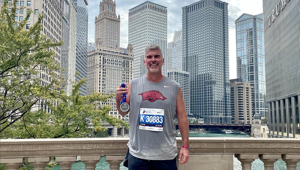
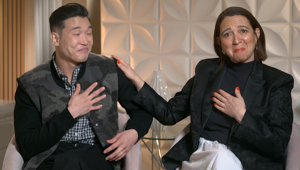









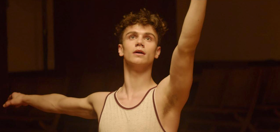
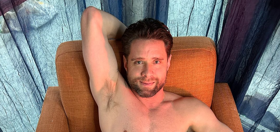
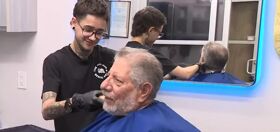
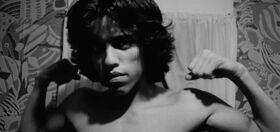


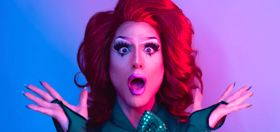
Kangol
Great, thorough and thoughtful interview! I can’t wait to see this film.
bowlingbutch
Great! I wish this had been around in the 70’s when I could dance and actually move! We’ve come a long way baby!
djmcgamester
Early years I was okay with everything. Somewhere along the line I started to get this idea in my head that “I’m different than those other gays”. Now I’m trending back toward “they’re my people, even if we’re not exactly the same”. Not sure how I got off-track but glad that’s changing.
KevInSD
Congrats on killing off that lone independent thought and re-joining the collective.